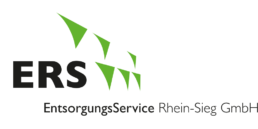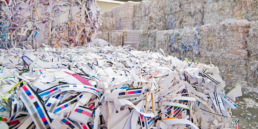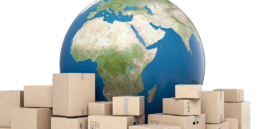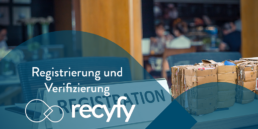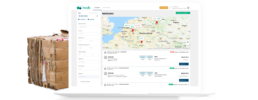Simple and fast processing of spot quantities
“We were involved early in the development process and are pleased with the good performance. The processing via recyfy is simple and fast. We like to use recyfy’s marketplace for spot quantities or short-term surplus quantities.”
Michael Dreschmann
Executive Director
ERS EntsorgungsService Rhein-Sieg GmbH

SMEs in the focus of the recovered paper market
While the entire economic environment of waste management and recycling has been dominated for years by consolidation, acquisitions and the entry of large corporations, the recovered paper market in Germany has so far remained dominated by medium-sized companies. The industry has developed over decades and has been able to successfully dovetail with global markets – not the least thanks to digital platforms such as recyfy.
To remain successful, however, effective strategies for the future are also needed outside the distribution channels. Many factors play a role in this: not only are collection and recycling rates stagnating or falling, but input qualities are also deteriorating. These developments also occupied the industry at this year’s recovered paper day of the bvse.
Threatening export restrictions, for example, had the potential to create national dependencies and hinder competition, warned Henry Forster, managing director of the Ihlenberger waste disposal company, at the conference. He added that there were further problems: “In the past, the waste paper collector was still the owner and trader of the waste paper and had a decisive influence on the quality of the collection, but today the attempt is being made to reduce his function more and more to that of a logistics provider through tenders,” said Forster.

The waste paper market, which is dominated by small and medium-sized enterprises, is also threatened by both large disposal companies and municipalities. Partnership-based, strategic cooperation is the best way to remain efficient and fit for the future. Especially in the regional area, Forster sees potential in finding new ways to use synergy effects while preserving the quality of the recovered paper.
Paper-based packaging? Sustainable?
Sustainability is very high on consumers’ agendas. This is particularly evident in preferences for packaging: More and more often, the choice in the supermarket falls on bottles, boxes or bags that are advertised as particularly ecological. Market researchers observe that not only practical but also emotional factors are part of the purchase decision – the entire customer experience including the “unboxing” is gaining in importance.
To market packaging as particularly sustainable, manufacturers and distributors are therefore increasingly using a material with paper content instead of pure plastic packaging. After all, the material offers consumers not only visual but also haptic experiences.
For the recovered paper industry, the trend is a double-edged sword: on the one hand, the growing share of packaging with paper content can result in increasing quantities of recovered paper. On the other hand, by far not all the newly marketed packaging can be easily recycled. For many applications, barrier layers are needed, which can be made of common or (under certain conditions) biodegradable plastics. The composite material often interferes with processes in common facilities: At best, it can be sorted out; under certain circumstances, it leads to contamination of entire batches.

To ensure real sustainability that does not end in greenwashing, consultancies recommend an exchange along the entire value chain: only if packaging manufacturers know the requirements of waste paper recyclers can they use materials that can be efficiently and fully recycled.
However, replacing plastic with fibres and the increasing focus on recallability could also be a short-term trend, according to industry experts. Market observers expect reusable packaging to gain importance in the long term. If the forecast proves true, stability and durability would become decisive factors. Whether plastic, glass, metal or fibers can benefit most from this is still an open question.
Explanatory video - Filter & Matching
The following product video explains the comfort functions of the recyfy marketplace: Filter & Matching. Save time when searching for suitable advertisements and filter all relevant advertisements according to your specifications.
With the matching function, you can always receive information about matching advertisements by e-mail without being on the marketplace.
You can find out how to set up the filter and matching functions and use them to 100% in our video.

recyfy is now in the DACH region!
As of July 2021, recyfy is expanding into the DACH region. Users of the recyfy marketplace can now publish, search and filter advertisements from Switzerland and Austria. By the end of the year, another four EU countries are planned.
From then on, nothing will stand in the way of international trade of waste paper on the recyfy marketplace!
Explanation video - Types of ads by recyfy
Get to know all the types of advertisements on the recyfy marketplace in our new product video. In less than three minutes, Sebastian Ben-Lahcen, Product Owner of recyfy, gives you an overview of the existing types of advertisements and their special features.
The following topics will be explained:
- public ads
- private ads
- spot and contracts

Explanation video - Registration and verification
Learn more about the process of registration and verification on the recyfy marketplace.
Sebastian Ben-Lahcen, Product Owner of recyfy, shows you how easy the registration process is for new users and what verification looks like on recyfy. But if you still have questions, feel free to contact service@recyfy.com or sign up for our free marketplace round-up webinars. You can find an overview of all upcoming webinars HERE.

recyfy is now a member of the BDE
On the 1st of May, recyfy joined the BDE (Bundesverband der Deutschen Entsorgungs-, Wasser- und Rohstoffwirtschaft e. V.). We are very happy to be a member of the largest association of the German waste management, raw materials, recycling and water industry.
With our new membership, we want to make our contribution to the digitalization of the waste and recycling industry and support the work of the association with all our resources. We look forward to a successful cooperation!
Waste paper trade 4.0: Waste as a resource
Ob junges Startup oder etablierter Player: Die Plattformökonomie birgt große Chancen im B2B-Markt. Entlang der gesamten Wertschöpfungskette können Unternehmen vom digitalen Handel profitieren – auch beim Abfallmanagement. Für den Handel mit Altpapier bietet der Onlinemarktplatz recyfy einfache, sichere Prozesse und eine unkomplizierte Dokumentation. Mit dem Zusatzmodul recyfy Connect wird der Handel über den Marktplatz sogar noch effizienter: Die Anbindung an ERP-Systeme sichert Wettbewerbsvorteile beim Entsorgungsmanagement und senkt Aufwand und Kosten beim Handel spürbar.
Innovative Produkte, effiziente Prozesse, steigende Rezyklatanteile: Die Hersteller und Verarbeiter von Papier, Karton und Pappe zeigen, dass sie Nachhaltigkeit, Klimaschutz und Kreislaufwirtschaft nicht als Hürde, sondern als Wachstumschance begreifen. Ein wunder Punkt bleibt bisher jedoch das Abfallmanagement. Für die Entsorgung von Altpapier müssen Papier- und Verpackungshersteller häufig noch zum Telefon greifen. Eine digitale Handelsplattform läutet den Wandel im Entsorgungsmanagement ein: Das Angebot des Berliner Start-ups recyfy fußt auf dem recyfy Marktplatz, der den effizienten und sicheren Handel von Altpapier mit Fokus auf Einkauf und Verkauf ermöglicht.
Europaweiter digitaler Handel mit Altpapier auf einem Marktplatz
Nutzern bietet der Marktplatz einen effizienten und sicheren Handel von Altpapier. Über 180 registrierte Unternehmen machen von diesem Angebot schon heute Gebrauch. Sie handeln jeden Monat mit mehr als 32.000 Tonnen Altpapier, unterteilt in 24 Sorten. Für die Nutzung der Plattform werden weder Aufnahmegebühren noch Monatsbeiträge fällig, sondern nur eine Vermittlungsgebühr für jede Transaktion, die ebenso wie die Staffelpreise von Mengen und Sorten abhängig ist.
Wer privat oder geschäftlich schon einmal über einen Online-Marktplatz gehandelt hat, weiß auch, wie die Plattform von recyfy funktioniert: Nach der einmaligen Anmeldung können Nutzer Inserate suchen und selbst erstellen, digital in die Verhandlung treten und innerhalb kürzester Zeit zum Abschluss kommen. Nachdem der Handel abgeschlossen ist, können beide Seiten die Transaktion bewerten – das stellt die hohe Qualität der Akteure sicher. Telefonate, E-Mails, der Übertrag in Tabellen, Ausdrucke und Kopien – all dieser Aufwand entfällt. Nutzer konzentrieren sich auf ihr Geschäft, während die Plattform alle Formalien innerhalb von Sekunden digital abwickelt.
Schon heute versammeln sich Papierfabriken, Entsorger und Händler auf dem Marktplatz zum digitalen Handel. Nun will das Berliner Unternehmen auch Druckereien, Handelsunternehmen und die Verpackungsindustrie einladen, um Altpapier zu besseren Konditionen und schneller zu vermarkten. Außerdem stehen in den kommenden Monaten weitere europäische Länder auf der Agenda, um auch internationale Ströme über den Marktplatz laufen zu lassen.

Schaubild recyfy Marktplatz
Optimierung und Digitalisierung von Abläufen nach dem Handel
Für den sicheren und schnellen Handel mit Altpapier ist der recyfy Marktplatz schon heute die beste Wahl, weil er sämtliche Prozesse entlang der Wertschöpfungskette digitalisiert. Jetzt hat recyfy das Angebot zusätzlich um eine Komponente ergänzt: Als Schnittstelle zum Enterprise Resource Planning integriert recyfy Connect den Marktplatz in bestehende IT-Systeme. Ob Hersteller, Verarbeiter, Händler oder Recycler – die vor- und nachgelagerten Prozesse des Entsorgungsmanagements können von allen Beteiligten entlang der Wertschöpfungskette automatisiert und digital abgebildet werden.
„Papier- und Verpackungshersteller betrachten den Lebenszyklus ihrer Produkte vom Design hin zum Recycling“, sagt René Drescher. Die Sichtweise der Altpapierhändler und -recycler ist genau umgekehrt, erklärt der recyfy-CEO: „Für diesen Teil unserer Nutzer beginnt die Wertschöpfung beim Abfall und endet, wenn daraus wieder neue Produkte entstehen. Mit recyfy Connect verbinden wir beide Denkweisen, sodass ein wirklicher Kreislauf entsteht.“
Indem es manuelle Prozesse automatisiert, verleiht recyfy Connect dem Altpapierhandel noch mehr Effizienz. Händische Prozesse und der Datenaustausch über Systeme hinweg werden einfach übernommen: Aus Zeitfressern wird ein integrierter digitaler Prozess, der automatisch erfolgt und mit wenigen Klicks bestätigt wird. Das Ergebnis ist in der Praxis am deutlichsten in Form von gesparter Zeit und Kosten spürbar. Doch durch die Automatisierung alltäglicher Prozesse steigt gleichzeitig auch die Effizienz und Verlässlichkeit im Altpapierhandel – unternehmensintern wie im Verhältnis mit Kunden und Abnehmern. Die Umstellung von Zettelwirtschaft auf digitale Dokumentation erhöht außerdem die Compliance.
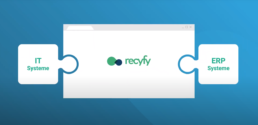
Schaubild recyfy connect
Digitalisierung des gesamten Abfallmanagements
Für 2021 hat das junge Unternehmen bereits weitere Schritte angekündigt: Neue Applikationen sollen die End-to-End-Digitalisierung des gesamten Stoffstroms ermöglichen. „Das wird dann zum Beispiel auch die vor- und nachgelagerten Prozesse umfassen“, führt Drescher aus: Von der Bedarfsplanung und -meldung, dem Daten-Matching und der Disposition über Auftragsabwicklung, Logistik, Nachverfolgung und Eingangskontrolle bis hin und zum Management von Reklamationen, Beschaffung und Verkauf können alle Prozesse zentral und automatisch organisiert werden.
Nutzer von recyfy Connect erhalten so systemübergreifend Vorteile. „Das Tool optimiert die Bedingungen für beide Seiten – Papierfabriken und Verpackungshersteller ebenso wie Entsorger“, erklärt Drescher die Vision. So können Mengen und Termine in einem zukünftigen Modul zwischen Papierfabrik und Verpackungswerk komplett digital abgewickelt werden. Mit recyfy stellt das Entsorgungsmanagement für die Hersteller und Verarbeiter von Papier nicht länger eine Hürde dar, sondern fördert die ökologische und ökonomische Nachhaltigkeit der Unternehmen und der Branche.

René Drescher, CEO und Angel Dimitrov, CTO
Pressekontakt:
Frau Solomiia Nechytailo
E-Mail: solomiia.nechytailo@recyfy.com
